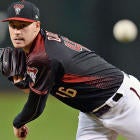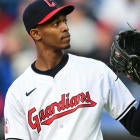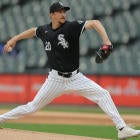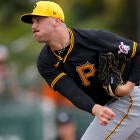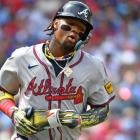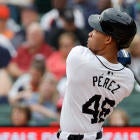The riskiest investment you can make in Fantasy sports is in a starting pitcher coming off a career season.
Most obviously, this is because you're buying a player at the peak of his value, which typically leaves mostly room a negative return on investment. However, with pitchers, the situation is even more dire, given how unpredictable the position is year over year. All but the best (and worst, for opposite reasons) pitchers tend to see their production fluctuate from year to year, whether due to injury, a change in team context or just plain randomness. All of that plays into the risk of buying into a nouveau ace.
Of course, we always want to draft pitchers coming off career years anyway. Ace pitchers are still the most valuable commodity in the game, and if the best predictor of future performance is past performance, you'll naturally gravitate to those coming off big performances.
In the case of the following seven, some of last year's biggest breakout stars, that hasn't paid off quite yet. Let's look into what's gone wrong and whether Fantasy players should still have high hopes for them pulling it off, starting with three of the easiest to answer for:
What's gone wrong? General regression
Look, deGrom was never going to replicate what he did last season. If you drafted him expected a sub-2.00 ERA, you were a fool. Career years happen, and it shouldn't be any kind of surprise that deGrom has settled back in as a very good starting pitcher, one you never have to worry about when setting your lineup. That should be more than good enough.
Level of concern: 0 out of 10
What's gone wrong? A little bit of bad luck
Sure, the ERA has risen more than a run and a half, and Snell just hasn't been quite as sharp as we would have hoped. However, by pretty much every advanced metric, he's actually pitched better than he did last season: He has a better FIP, xFIP, and SIERA. He's had a bit of bad BABIP luck, and a bit of bad homer luck, but every indicator suggests Snell should be a sub-3.00 ERA pitcher moving forward.
Level of concern: 0 out of 10
What's gone wrong? A lot of bad luck
Cole's ERA is less than a run higher than a year ago, but he's arguably suffered from worse luck than anyone else on this list. He has raised his already elite strikeout rate to 38.6%, while actually lowering his walk rate to 5.9%. Those would be great numbers for a closer, let alone someone averaging six innings per start. Cole is also surrendering fewer batted balls in the air. Add it all up, and you've got a 2.58 SIERA and a 2.37 xFIP, MLB-best marks. Nobody who has Cole should be worried, but if the person in your league is, go ahead and make an offer. You just may get the best pitcher in baseball out of it.
Level of concern: 0 out of 10
What's gone wrong? Pitch mix
Bauer has always been a tinkerer, but he seemed to find the perfect pitch mix in 2018. A new slider gave him another swing-and-miss weapon, and his five-pitch mix kept batters off balance all game long. However, that mix just hasn't been as successful for him this season. Bauer has dropped his curveball usage to his lowest levels since 2016, while trading sliders for cutters, his worst pitch in 2018 — and his worst pitch in 2019 by expected wOBA, per BaseballSavant.com. Maybe he hasn't had a feel for his curve yet, but it remains his best pitch, so it's hard to see how throwing it less will help things. The good news is, Bauer might just tinker his way back into dominance, but it's hard to ignore that 2019 looks a whole lot like Bauer's whole career, with 2018 looking like the outlier.
Level of concern: 6 out of 10
What's gone wrong? Batters adjusted
Corbin's breakout in 2018 was fueled by a pretty simple adjustment: He started throwing the slider, his best pitch, as often as he could. He used it 41.3% of the time, and added in a slower curveball 9.0% of the time, making him primarily a breaking ball pitcher. That tricked worked incredibly well, inducing swings on 38.0 percent of pitches outside of the zone, while throwing more than 65% of his pitches outside of the strike zone. However, hitters have adjusted, swinging at a lower rate of pitches outside of the zone than his career mark, forcing Corbin to go away from his slider, with the usage dropping to 36.7%, his lowest rate since 2016. Corbin was a one-trick pitcher, but it was a heck of a trick. Now that batters have adjusted to it, can he come up with another adjustment? Given how middling his non-slider stuff is, it's a tough question. One I was asking before the season.
Level of concern: 7 out of 10
What's gone wrong? No deception
The stuff looks fine, but Nola just isn't fooling anyone right now. The elevated walk rate looks alarming, but it's not like he's suddenly lost the ability to throw strikes — Nola's in-zone pitch percentage is basically identical to his career averages. What has changed is that opposing hitters just aren't swinging at anything, especially outside of the strike zone. His overall swing rate has dropped from 47.0% to 40.4, and has fallen to 27.6% on pitches out of the strike zone. Hitters are daring Nola to throw the ball in the zone, and they're doing damage when he does, with his expected wOBA allowed on contact (taking away strikeouts and walks) is .395, up from .323 a year ago. You almost wonder if Nola is tipping his pitches, given how stark this change is without much change in the apparent quality of the stuff — he still rates out in the 82nd percentile, per SportsLine's ACES metric.
Level of concern: 4 out of 10
What's gone wrong? Coors Field is undefeated
It's really not any more complicated than that. Marquez has been a borderline ace outside of Coors, with a 3.33 ERA and 0.822 WHIP, but his 5.06 ERA at home has pulled him from the ranks of the must start. This shouldn't come as too much of a surprise, of course; he had a 4.74 ERA at Coors last season. We put a lot of weight on Marquez's incredible final 17 starts, but you're usually better off going by full-season statistics than arbitrary endpoints when projecting forward; another useful lesson to take from here. We assumed Marquez was different, just like we assumed Ubaldo Jimenez before him was different. To be good at Coors Field, you have to be perfect. The margin for error is slim, and Coors Field catches up to everyone.
Level of concern: 8 out of 10
What's gone wrong? Injury
Foltynewicz was always a likely regression candidate coming off a breakout season that saw him outperform his SIERA by nearly a full run. However, once he suffered a sore elbow in spring training, I took him off my draft board entirely. His underlying skill set simply wasn't strong enough to bet on him coming off an injury. You're hoping for a high-3.00s ERA and some strikeouts from Foltynewicz when healthy, but his career track record shows even that was no safe bet. We'll see if he can get back to that as he moves further away from the injury, but the upside isn't high enough to justify stashing him right now.
Level of concern: 10 out of 10




























